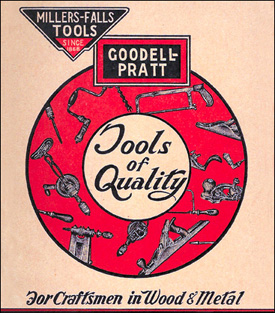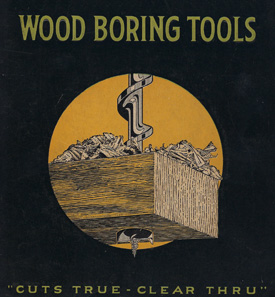oldtoolheaven.com
About oldtoolheaven.com
 Over the years the focus of this site has shifted. While it is still home to an encyclopedic study of the Millers Falls Company, a Massachusetts-based tool manufacturer, its scope has expanded. A series of a half-dozen major revisions have resulted in a site that has gone beyond the original vision.
Over the years the focus of this site has shifted. While it is still home to an encyclopedic study of the Millers Falls Company, a Massachusetts-based tool manufacturer, its scope has expanded. A series of a half-dozen major revisions have resulted in a site that has gone beyond the original vision.
The origins of oldtoolheaven.com can be traced to a single web page—a 1996 study of design variations in the Millers Falls Company's line of bench planes. Despite the commercial implications of its .com domain name, the intent of the site has always been educational. New pages, focused on the Millers Falls Company's history, were among the first to be added. An illustrated listing of the company's publications appeared not long after. Addition followed addition until at last count, the site included some 3,159 files distributed among sixty-three folders.
The product of over nearly three decades of research, oldtoolheaven.com is revised as new information comes to light. The author, Randy Roeder, worked as an academic librarian for thirty-five years and has written over a half dozen tool-related articles for the Gristmill: the journal of the Mid-West Tool Collectors Association, and the Fine Tool Journal.
The Millers Falls pages
The Millers Falls pages focus on the tools and activities of the company between its founding in 1868 and a leveraged buyout in 1982. Though the firm manufactured and distributed precision tools, mechanics' tools, and power tools, its hand planes, bit braces, drills, miter boxes, treadle tools, and push drills are emphasized here. Over the years the company absorbed a number of tool-related businesses and served as a launching pad for others. Notable among these are the Goodell-Pratt Company, the Langdon Mitre Box Company, Gunn, Amidon & Company, and the various enterprises of Charles H. Amidon and Quimby S. Backus. The coverage of two of these companies, Goodell Pratt and Langdon, is substantial enough to justify links on this page.
The Goodell-Pratt pages
The Goodell-Pratt Company could trace it origin to a small shop run by Albert and Henry Goodell in Buckland, Massachusetts in the latter 1860s. The brothers sold their business to the Millers Falls Company in the early 1870s and joined the ranks of the firm's employees. They left the operation in the late 1880s to go into business as the Goodell Brothers Company. Henry L. Pratt bought a controlling interest in the operation and in 1899, renamed it the Goodell-Pratt Company. The company grew rapidly, and by 1917 could boast of a line of "1500 good tools."
Goodell-Pratt offered a comprehensive array of precision, carpenters' and mechanics' tools. It acquired major parts of its product line through purchase rather than development. The various companies and individuals associated with these acquisitions turned out well-designed, high quality products. As a result, the history of the company is complex, and the relationships between the major players are varied and interesting. The Millers Falls Company absorbed an overextended Goodell-Pratt at the height of the Great Depression.
The Langdon Mitre Box pages
 The Langdon pages cover the years when the Langdon Miter Box Company was an independent entity, before its absorption by Millers Falls. When Leander W. Langdon patented his woodworkers' mitering device in 1864, the directors of the Northampton Pegging Machine Company acquired the rights to its manufacture. Production of the miter box continued in Northampton (Mass.) until the 1875 bankruptcy of the pegging machine company. The David C. Rogers family purchased the rights to Langdon's miter box and moved production to the Millers Falls Company factory. Though located within the Millers Falls Company factory, Langdon remained independent until 1907.
The Langdon pages cover the years when the Langdon Miter Box Company was an independent entity, before its absorption by Millers Falls. When Leander W. Langdon patented his woodworkers' mitering device in 1864, the directors of the Northampton Pegging Machine Company acquired the rights to its manufacture. Production of the miter box continued in Northampton (Mass.) until the 1875 bankruptcy of the pegging machine company. The David C. Rogers family purchased the rights to Langdon's miter box and moved production to the Millers Falls Company factory. Though located within the Millers Falls Company factory, Langdon remained independent until 1907.
Auger Bit Heaven
This section of the site features information on several of the various American companies that produced auger bits. At present, it includes sections on the Connecticut Valley Manufacturing Company (CONVALCO), Ezra L'Hommedieu, the Irwin Auger Bit Company, the Russell Jennings Company, the Snell Manufacturing Company, the W. A. Ives Mfg. Company, and Job T. Pugh.
The Reprint Room
The Reprint Room is an illustrated checklist of tool-related publications that have been reproduced from the originals in paper format. The bulk of the resources featured here are copies of company catalogs.